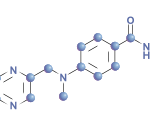Drug News
A recent phase III, placebo-controlled study of adalimumab in patients (n=185) with active nonradiographic axial spondylarthritis (NRAS) was associated with significant improvements in physical function and health-associated quality of life.1 Patients received adalimumab or placebo for 12 weeks, after which 179 patients continued to receive adalimumab in an open-label manner for 144 additional weeks. After 52 weeks, 77% percent of patients met the minimum important difference for improvement in health-associated quality of life, and around 62% of patients met the minimum important difference for improvement in self-reported physical function. In July 2012, the European Commission approved adalimumab for the treatment of severe NRAS.
New ACR gout guidelines were recently released, stating that xanthine oxidase inhibitors—either allopurinol or the newer febuxostat—can be used first line as urate-lowering therapies. In addition, target serum urate levels should be below 6 mg/dL.2 Allopurinol should still be the first choice for most patients, and it costs only about $15 a month. Since febuxostat is relatively new and “brand only,” it carries a price tag of around $180 a month.3 In clinical trials, only the 80-mg dose of febuxostat was more effective than 600 mg of allopurinol. Hypersensitivity reactions are more common with allopurinol so far, so if patients develop any allergic types of reactions such as itching or a rash, they should discontinue it immediately. Also remember to adjust doses for patients with impaired renal function.
Denosumab has been U.S. Food and Drug Administration (FDA) approved to increase bone mass in men with osteoporosis who are at high risk for fracture.4 There are approximately two million U.S. men who have osteoporosis, with an additional 12 million who are at risk for developing osteoporosis. Osteoporotic fractures and osteoporosis in men remain underdiagnosed and undertreated.
Low-dose, delayed-release prednisone, branded as Rayos in the United States and Lodotra in Europe, was approved earlier this year.5 It is a proprietary formulation of low-dose prednisone. Although the pharmacokinetics of this new formulation differ in its approximate four-hour lag time compared to that of traditional, immediate-release prednisone products, its absorption, distribution, and elimination processes are comparable to immediate-release prednisone. When taken, it should be given with food to improve absorption. Tablets should not be divided, broken, or chewed. Although yet to be seen in clinical practice, it is recommended for 10 p.m. dosing to coincide with middle-of-the-night and early-morning inflammation, when cytokine levels start to rise. Generic prednisone is still a better bet for patients, and the cost is substantially different as well. Rayos costs around $200 a month for 30 tablets of the 5 mg strength, whereas generic prednisone may be as low as $4 at some large discount pharmacies or through $4 generic programs.6

